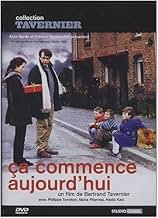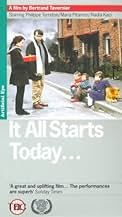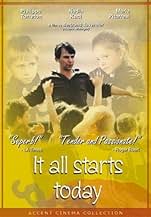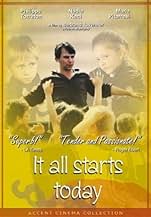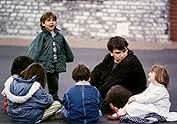IMDb-BEWERTUNG
7,4/10
3045
IHRE BEWERTUNG
Daniel ist Schulleiter eines Kindergartens in einer französischen Kleinstadt. Zusammen mit dem Personal des Kindergartens arbeitet er unermüdlich daran, die Kinder einer schwer gestörten Ges... Alles lesenDaniel ist Schulleiter eines Kindergartens in einer französischen Kleinstadt. Zusammen mit dem Personal des Kindergartens arbeitet er unermüdlich daran, die Kinder einer schwer gestörten Gesellschaft zu erziehen.Daniel ist Schulleiter eines Kindergartens in einer französischen Kleinstadt. Zusammen mit dem Personal des Kindergartens arbeitet er unermüdlich daran, die Kinder einer schwer gestörten Gesellschaft zu erziehen.
- Regie
- Drehbuch
- Hauptbesetzung
- Auszeichnungen
- 12 Gewinne & 8 Nominierungen insgesamt
Empfohlene Bewertungen
A kindergarden in a poor zone. Its director working, in hard, passioned and deceived manner for the good of his students. Social problems, burocracy, suicide case and the support of his girlfriend, devasted school and new beginnings.
But, more important, wonderful result of collaboration of Bernard Tavernier and Philippe Torreton.
Obvious, more than a very inspired film, it is a precious testimony about the status and meanings, fights and idealism of teacher.
A great film, with powerful social message, so present in the French cinematography of the last decades , beautiful nuanced , for the lage slices of near reality naked facts, from abuse in different forms, against minors to the obtusity of autorities.
So, must see it ! For understand the pieces defining near reality essence.
But, more important, wonderful result of collaboration of Bernard Tavernier and Philippe Torreton.
Obvious, more than a very inspired film, it is a precious testimony about the status and meanings, fights and idealism of teacher.
A great film, with powerful social message, so present in the French cinematography of the last decades , beautiful nuanced , for the lage slices of near reality naked facts, from abuse in different forms, against minors to the obtusity of autorities.
So, must see it ! For understand the pieces defining near reality essence.
One of those films about human stories that touches you since the very first moment. Those who like real human stories with something deep and authentic to say must see this movie. Touching performance by its main character Phillipe Torreton and amazingly realistic performance by the children appearing, many times 20 or 30 at same time. If you want to see pure cinema and identify with the characters, this a must see for you
This film is an excellent commentary of the sheer difficulties in trying to improve a bad situation when the whole system - from the families involved to the political authorities - are effectively working against you. It shows that it is vital to persevere because to give up would be awful. Its ultimately optimistic about the strength of the human spirit but scathing about the corrupting and degrading influence of the system.
The only criticisms are that the camera technique was very fluid which meant that the picture was always moving up and down, in and out of focus. This was interesting but quite taxing on the eyes. Also, it was perhaps half an hour longer than it could have been so it dragged somewhat in places. But a very good film. 4/5
The only criticisms are that the camera technique was very fluid which meant that the picture was always moving up and down, in and out of focus. This was interesting but quite taxing on the eyes. Also, it was perhaps half an hour longer than it could have been so it dragged somewhat in places. But a very good film. 4/5
Don't settle down for a comfortable couple of hours easy entertainment. This film carries a message and it will thrash you with it. This is not a film with a stylised story set out in the classical beginning-middle-ending formula; it is a film which swings from scene to scene, at times hectically, with splendid unrehearsed sequences shot with continual changes and panning at frequently too high speed, swinging from schoolmaster to clusters of young faces, zooming in on one, lifting up to worried mothers bursting in, and back down to the schoolmaster, at trepidating speed, breathlessly, at whatever price, because the important thing was to get it all as it happened, how it happened; no way of organising thirty little kids to do the scene again: it would be just too artificial and useless.
The price is some lack of focussing, but it is worth the end result: Alain Choquart under Tavernier's orders achieves something monumental, something magical as his agility with the camera swoops around the school capturing every taut smile, every nervous finger-twisting, the first tears from a hysterical mother... Bertrand Tavernier comes out of that French school of film-making to which he adhered for most of his earlier output and from which he tried to break away with risky excursions into adventure cinema in 'La Fille DE D'Artagnan' (which must have worried Alexandre Dumas) and 'Capitaine Conan' (which must have worried quite a lot of people), as if in a desperate attempt to reach Hollywood-tradition epic proportions.
With 'Ça commence aujourd'hui' everything comes back to earth with a rather nasty bump: Tavernier gets down to the gritty bits of sordid suburbs on the edge of an industrial city (Lille) where in most families the father of the household is either out of work, or drunk, or both, or has run away; the local schoolmaster takes it on himself to fill the rôle of father, a job which Phillipe Torreton carries out brilliantly, aided and abetted by his girl-friend, Maria Pitarresi, who doesn't.
But perhaps the brilliance of the film resides in the sheer pace, as the cameraman has to keep his wits about him so as not to lose those gestures, in what must be the nearest thing to live, unrehearsed cinema: above all in the rapid shots among the small children, where there is no acting or interpretation - it is all too direct, too immediate for any kind of infantile amateur acting classes.
There may be a few technical weaknesses due to the way in which the film just had to be made, but the end result is monumental, a brilliant though agonising document.
Every European politician should be forced to see it: maybe a few of them would wake up and decide to do something useful.
The price is some lack of focussing, but it is worth the end result: Alain Choquart under Tavernier's orders achieves something monumental, something magical as his agility with the camera swoops around the school capturing every taut smile, every nervous finger-twisting, the first tears from a hysterical mother... Bertrand Tavernier comes out of that French school of film-making to which he adhered for most of his earlier output and from which he tried to break away with risky excursions into adventure cinema in 'La Fille DE D'Artagnan' (which must have worried Alexandre Dumas) and 'Capitaine Conan' (which must have worried quite a lot of people), as if in a desperate attempt to reach Hollywood-tradition epic proportions.
With 'Ça commence aujourd'hui' everything comes back to earth with a rather nasty bump: Tavernier gets down to the gritty bits of sordid suburbs on the edge of an industrial city (Lille) where in most families the father of the household is either out of work, or drunk, or both, or has run away; the local schoolmaster takes it on himself to fill the rôle of father, a job which Phillipe Torreton carries out brilliantly, aided and abetted by his girl-friend, Maria Pitarresi, who doesn't.
But perhaps the brilliance of the film resides in the sheer pace, as the cameraman has to keep his wits about him so as not to lose those gestures, in what must be the nearest thing to live, unrehearsed cinema: above all in the rapid shots among the small children, where there is no acting or interpretation - it is all too direct, too immediate for any kind of infantile amateur acting classes.
There may be a few technical weaknesses due to the way in which the film just had to be made, but the end result is monumental, a brilliant though agonising document.
Every European politician should be forced to see it: maybe a few of them would wake up and decide to do something useful.
"Teaching tugs at the heart, opens the heart, even breaks the heart, And the more one loves teaching, the more heartbreaking it can be." - Parker Palmer, a veteran educator
Daniel Lefebvre (Philippe Torreton) is teacher and director of the école maternelle, a pre-school open to children ages 2 to 6 in northern France. In Bernard Tavernier's deeply moving film, It All Starts Today, the children are the stars. Their faces and loving smiles shine through the grimness of their circumstances. Based on the notebooks of Tavernier's son-in-law Dominique Sampiero, a provincial teacher, the film is about the difficulties and challenges of children but is also a tribute to the courage and commitment of teachers. Lefebvre is a poet whose voice-over narration adds a touching lyricism to the film. "We'll tell our children it was hard", he writes. "Piles of stones placed one by one. We'll tell the children it was hard but their fathers are lords and this is their legacy. A pile of stones and the courage to lift them".
The school is in a town that has been hit hard by the closure of the coal mine, and where unemployment has reached 34 percent. Lefebvre is a gentle and compassionate teacher but a tough administrator who tries to shake the political bureaucracy into providing adequate programs for the school. He protests loudly against budget cuts and insensitive government regulations and the shortage of trained professionals. Lefebvre shows anger and frustration in the scene where he slams the door in the face of a visiting social worker, and when he storms into the Mayor's office to rail against cutbacks in the school lunch program. He is hardest on himself, however, when tragedy befalls an alcoholic mother and her family, and when his common-law wife Valeria's (Maria Pitteresi) young son Remi (Lambert Marchal) gets into trouble, challenging his commitment to return to the school the following year.
The problems of the school are severe but not exaggerated. Being the husband of a pre-school teacher I know the kinds of circumstances that parents and teachers face every day and they are not that different from those shown in the film. Tavernier does not idealize the poor or romanticize their circumstances but shows us conditions as they exist. This is a message film and we do get the message, but it doesn't seem preachy because it comes from a passion that springs naturally from the lives of the characters. But the magic of the film lies in the children themselves. There is no acting or interpretation. The camera zooms around the school with lightning speed catching the spontaneity of the children singing, dancing, talking, playing, and just being themselves. It All Starts Today does not offer any simple solutions and can be dark, but, at the end, when each child comes up to the camera for a final smile I felt only lightness and joy. Being around children and adults with courage will do that.
Daniel Lefebvre (Philippe Torreton) is teacher and director of the école maternelle, a pre-school open to children ages 2 to 6 in northern France. In Bernard Tavernier's deeply moving film, It All Starts Today, the children are the stars. Their faces and loving smiles shine through the grimness of their circumstances. Based on the notebooks of Tavernier's son-in-law Dominique Sampiero, a provincial teacher, the film is about the difficulties and challenges of children but is also a tribute to the courage and commitment of teachers. Lefebvre is a poet whose voice-over narration adds a touching lyricism to the film. "We'll tell our children it was hard", he writes. "Piles of stones placed one by one. We'll tell the children it was hard but their fathers are lords and this is their legacy. A pile of stones and the courage to lift them".
The school is in a town that has been hit hard by the closure of the coal mine, and where unemployment has reached 34 percent. Lefebvre is a gentle and compassionate teacher but a tough administrator who tries to shake the political bureaucracy into providing adequate programs for the school. He protests loudly against budget cuts and insensitive government regulations and the shortage of trained professionals. Lefebvre shows anger and frustration in the scene where he slams the door in the face of a visiting social worker, and when he storms into the Mayor's office to rail against cutbacks in the school lunch program. He is hardest on himself, however, when tragedy befalls an alcoholic mother and her family, and when his common-law wife Valeria's (Maria Pitteresi) young son Remi (Lambert Marchal) gets into trouble, challenging his commitment to return to the school the following year.
The problems of the school are severe but not exaggerated. Being the husband of a pre-school teacher I know the kinds of circumstances that parents and teachers face every day and they are not that different from those shown in the film. Tavernier does not idealize the poor or romanticize their circumstances but shows us conditions as they exist. This is a message film and we do get the message, but it doesn't seem preachy because it comes from a passion that springs naturally from the lives of the characters. But the magic of the film lies in the children themselves. There is no acting or interpretation. The camera zooms around the school with lightning speed catching the spontaneity of the children singing, dancing, talking, playing, and just being themselves. It All Starts Today does not offer any simple solutions and can be dark, but, at the end, when each child comes up to the camera for a final smile I felt only lightness and joy. Being around children and adults with courage will do that.
Wusstest du schon
- WissenswertesCo-screenwriter Dominique Sampiero was Bertrand Tavernier's son-in-law. He was also a headmaster and drew on over 20 years experience for the screenplay.
- VerbindungenFeatured in In the Shadow of Hollywood (2000)
Top-Auswahl
Melde dich zum Bewerten an und greife auf die Watchlist für personalisierte Empfehlungen zu.
- How long is It All Starts Today?Powered by Alexa
Details
Box Office
- Bruttoertrag in den USA und Kanada
- 12.348 $
- Eröffnungswochenende in den USA und in Kanada
- 2.639 $
- 29. Sept. 2000
Zu dieser Seite beitragen
Bearbeitung vorschlagen oder fehlenden Inhalt hinzufügen

![Bande-annonce [OV] ansehen](https://m.media-amazon.com/images/M/MV5BNzNjNjkwYzEtOGRjOS00MGM2LWIwMDMtYmExMTE2YmY1MDgwXkEyXkFqcGdeQXRyYW5zY29kZS13b3JrZmxvdw@@._V1_QL75_UX500_CR0)
